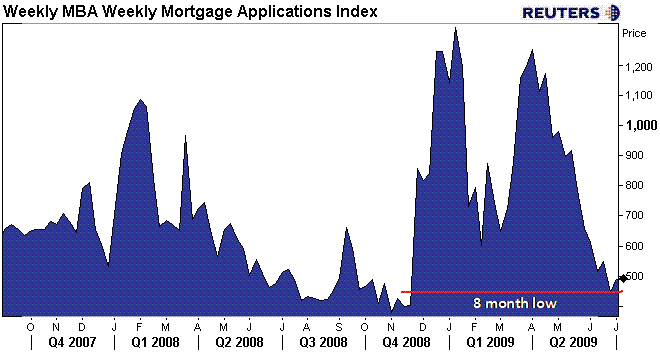Blog

Mortgage Applications Rebound, Rates Unchanged
Demand for mortgage loans rebounded from an eight month low last week, even as the average rate for a 30-year conventional mortgage failed to improve.
The Mortgage Bankers Association said, in the holiday shortened week ending July 3, 2009, the Market Composite Index, a measure of mortgage loan application volume, rose to 493.1 (+10.9%) after plummeting by 19% to 444.8 in the prior week.

Interestingly, the 10.9% rebound took place even as mortgage rates were unchanged at 5.34%. However, before seasonal adjustments the weekly application figure was in a fact 0.5% lower than the prior week, suggesting that homeowners are still unsatisfied with the spike in mortgage rates that occurred in late May.
Mark Zandi, chief economist at Moody’s Economy.com, expressed hope five weeks ago that mortgage rates would drop to 4.5% by summer, but recently he’s backtracked on that prediction, and with good reason.
“4.5% seems increasingly less likely,” Zandi said this week. “I'm hoping rates move back to below 5% in the next few weeks.”
Refinance-related loans accounted for 48.4% of all loans in the MBA survey, bouncing up 7.2% in the week after tumbling 30.0% in the prior week. Adjustable-rate mortgages made up 4.4% of all loans.
The Purchase Index also advanced, increasing 6.7% from the 9-month low seen last week.
It’s now been five months since President Obama instituted his housing rescue plan, yet according to CNN loan services have been overwhelmed by the number of homeowners applying to loan modifications and refinancing, causing Obama to concede last month that the program wasn’t helping on all fronts.
“Our mortgage program has actually helped to modify mortgages for a lot of our people, but it hasn't been keeping pace with all the foreclosures that are taking place,” the President acknowledged.
According to RealtyTrac, a staggering 1.5 million homeowners received a foreclosure filing between January and June.
Meanwhile, an index from PMI Mortgage Insurance Co. released yesterday suggests that housing prices in 85% of the nation’s 381 metropolitan areas would be lower in two years from now.
“Rapidly rising foreclosures and unemployment rates, continuing declines in house prices and weakening consumer demand all worked to increase risk in the general economy, and the housing market specifically,” said PMI chief economist David Berson.
As house prices fall, demand should begin to pick up and reduce the excess inventory on the market, which is necessary for the real estate market to stabilize. However the timing of such a stabilization remains a mystery as macroeconomic optimism has recently turned less positive.
All Content Copyright © 2003 – 2009 Brown House Media, Inc. All Rights Reserved.nReproduction in any form without permission of MortgageNewsDaily.com is prohibited.
Latest Articles
By John Gittelsohn August 24, 2020, 4:00 AM PDT Some of the largest real estate investors are walking away from Read More...
Late-Stage Delinquencies are SurgingAug 21 2020, 11:59AM Like the report from Black Knight earlier today, the second quarter National Delinquency Survey from the Read More...
Published by the Federal Reserve Bank of San FranciscoIt was recently published by the Federal Reserve Bank of San Francisco, which is about as official as you can Read More...

Comments
Leave a Comment